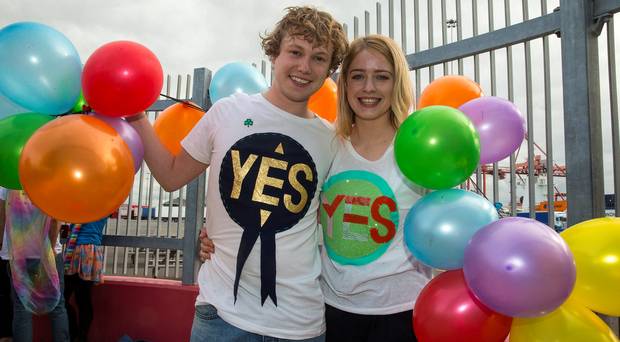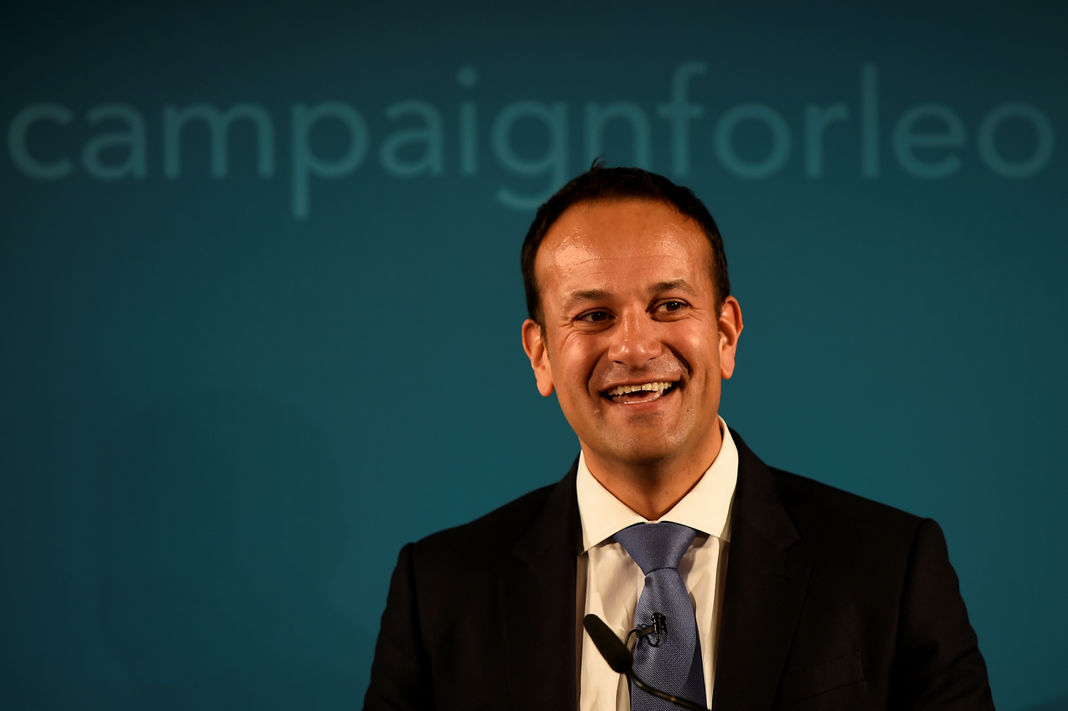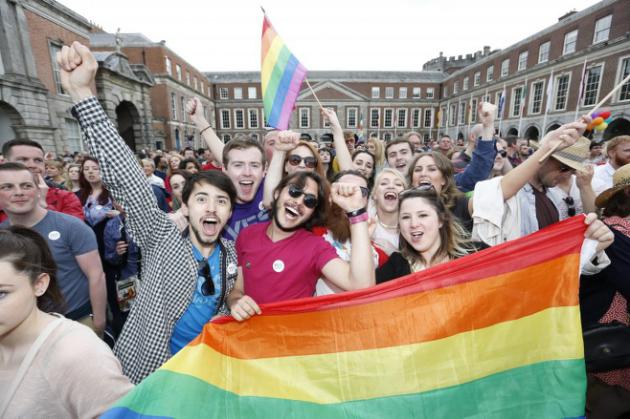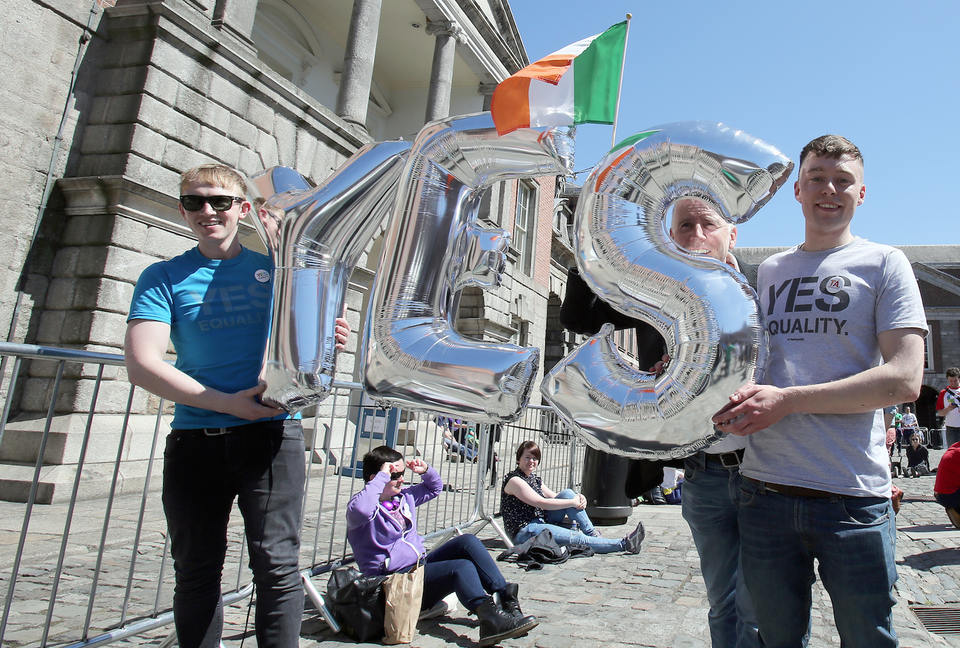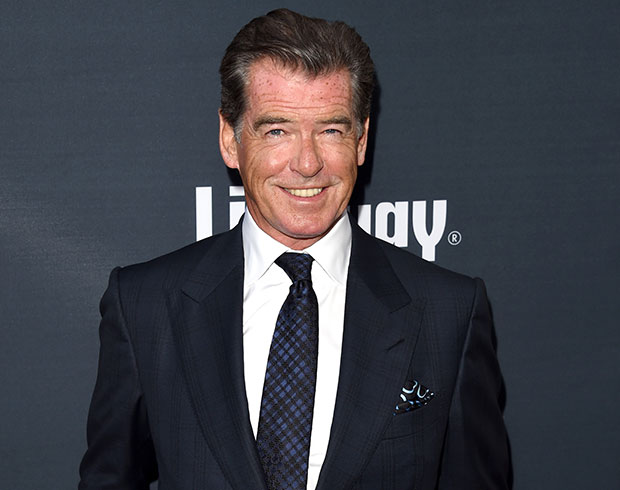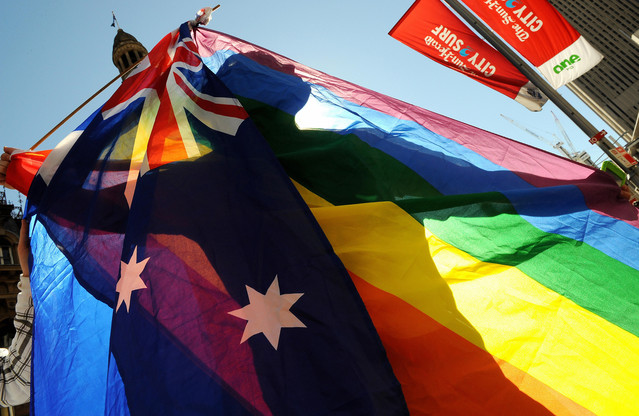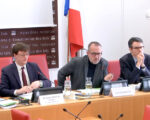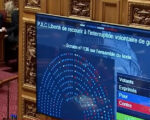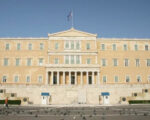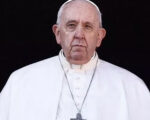>> Early indications suggest Ireland vot
[spacer]
Les résultats définitifs du scrutin seront connus ce samedi après-midi mais, d’après les intentions de vote mesurées par les instituts de sondage, les Irlandais ont massivement voté en faveur de la légalisation du mariage gay lors du référendum organisé ce vendredi 22 mai. Information confirmée par le ministre de l’Egalité après le début du décompte des suffrages.
“I’m calling it. Key boxes opened. It’s a yes. And a landslide across Dublin. And I’m so proud to be Irish today. #MarRef
— Aodhán Ó Ríordáin TD
L’un des principaux responsables de la campagne du non a en outre concédé samedi la défaite de son camp :
“C’est une claire victoire pour le camp du oui” au mariage homosexuel, a déclaré à la télévision irlandaise RTE David Quinn, directeur de l’Institut Iona, un groupe défendant les intérêts de la communauté catholique, alors que les opérations de dépouillement étaient en cours dans la matinée. Selon ce responsable, le oui aurait remporté environ deux bulletins sur trois, “d’après les premiers décomptes”.
“C’est objectivement une victoire impressionnante pour le oui”, a ajouté M. Quinn, adressant ses “félicitations” aux partisans du mariage homosexuel.
[spacer]
[spacer]
Les résultats définitifs du scrutin, par lequel l’Irlande devrait être le premier pays au monde à légaliser le mariage pour tous au terme d’une consultation populaire, sont attendus cet après-midi.
“Je crois que c’est gagné”, a déclaré samedi matin à Reuters Aodhan O Riordain. “J’ai assisté à l’ouverture d’urnes venant de bureaux de vote représentatifs, dans des régions pas forcément réputées libérales et le ‘oui’ l’emporte de manière éclatante”, a ajouté le ministre de l’Egalité.
A Dublin, selon la chaîne publique RTE, la participation a frôlé les 60%, du jamais vu depuis des années pour une consultation référendaire. La consultation a pris une dimension internationale et le mot-clé #VoteYes est devenu l’un des sujets les plus commentés sur Twitter.
[spacer]
[spacer]
>> Early indications are that Ireland has voted in favor of same-sex marriage, Irish media reported Saturday, as the process of counting votes in the landmark referendum continues.
If passed, it would make Ireland the first country in the world to legalize same-sex marriage through a popular vote.
According to state broadcaster RTE, voter turnout was above 60% in some parts of the country, noticeably higher than seen in other referendums.
The Irish Times newspaper said turnout in Dublin was as high as 65%, raising the hopes of “yes” campaigners that high engagement by young voters and those in urban areas could carry the result their way.
There was speculation that opposition to the measure might have been understated in the run-up to the poll because, amid the heated debate, people have been shy of saying they plan to vote “no.”
But RTE reported that early indications were that the “yes” vote would win out.
Labour lawmaker Kevin Humphreys, Ireland’s Minister of State for Employment, Community and Social Support, tweeted that vote tallies in Dublin on a “historic day” showed the “yes” vote was “big and fat.”
On the opposite side of the fence, David Quinn — a director of the Iona Institute, a conservative Catholic think tank that advocated against legalizing same-sex marriage — tweeted, “Congratulations to the Yes side. Well done. #MarRef.”
The official vote results are expected to be announced Saturday afternoon local time.
‘Yes’ vote would permit civil marriage for gay, lesbian couples
As in many other countries around the world, the issue is a polarizing one. And the referendum is being seen as a test of whether in Ireland, a majority Catholic nation, more liberal thinking can trump conservative, traditional leanings.
Opinion polls before the vote suggested that the “yes” vote was on track to come out on top, but that the gap was narrowing.
If the referendum is passed, a change to the constitution will give gay and lesbian couples the right to civil marriage, but not to be wed in a church.
Ireland’s political parties have backed the change. Prime Minister (or Taoiseach) Enda Kenny said this week that the country could “create history” and that a “yes” vote would “obliterate” prejudice along with irrational fears of difference.
Opposition to the constitutional change has been largely organized by Catholic groups that have focused on a message of protecting the traditional family.
The referendum was a social media sensation, with many Irish people returning from abroad to vote in favor of same-sex marriage, then joyfully telling the world about it using the #HometoVote hashtag.
“Seeing the amount of people here in the airport who are #hometovote has me in floods!” tweeted one woman. “I feel very proud to be Irish right now.”
A man added, “Took a few days to get #hometovote from Nepal but getting job done with the family #VoteYes #MarRef #MakeGraTheLaw”
‘About civil marriage equality’
Ireland’s “Yes” campaign has been spearheaded by an umbrella group called Yes Equality, established by gay rights campaign groups with the backing of civic society organizations and grassroots campaigners across the country.
The right to civil partnership for same-sex couples in Ireland was introduced in 2010. But on its website, Yes Equality argues that it differs significantly from marriage in the level of recognition and protection it affords to same-sex couples and their families.
The outcome of the referendum won’t have any bearing on surrogacy or adoption rights, it says.
The possible new marriage laws also wouldn’t represent any threat to religious freedom, according to Yes Equality.
“The referendum is about civil marriage equality,” the group says. “Churches will be able to continue with religious ceremonies and will not be required to conduct wedding ceremonies for same-sex couples.”
The message of equality appears to have resonated with many voters.
One, 46-year-old Tim Mudie, from Dublin, told CNN on Friday, “I voted yes. It’s outrageous that my gay and lesbian friends are not able to do what they want to do.”
Called a threat to religious freedom
A video produced by one group opposed to the change, Mandate for Marriage, argues that “redefining marriage” is a global threat to religious freedom pushed by “homosexual activists” and has been rejected by voters elsewhere, including some states in the United States.
That group’s video also posits that redefining marriage is bad for parents and children.
“Without exception, every child reared by a same-sex couple is denied either a father or a mother,” the video’s narrator states.
Speaking to CNN on the eve of the poll, Joanna Jordan, of Dublin, told CNN that concern for the family unit was why she planned to vote against the constitutional change.
“I’m voting no because, as far as I’m concerned, marriage has always been between a man and a woman since the beginning of time and there’s no reason to change it,” she said. “Marriage is basically to set the scene for children to come into the world in the best possible way.”
CNN’s Laura Smith-Spark wrote and reported from London and Phil Black reported from Dublin. CNN’s Hazel Pfeifer contributed to this report.


